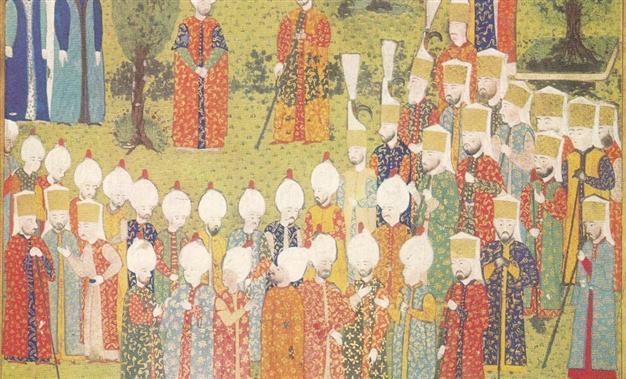Ottoman life, society and customs revealed with newly published book
ISTANBUL - Anadolu Agency

A recently released book, “100 customs of Istanbul,” sheds light on the cultural and social way of life during Ottoman times.
According to the written statement made by Kültür AŞ, the book provides insights into Istanbul’s customs, urban life, traditions and also Bayrams. The bayram traditions and daily customs are revealed in the book and also how the sultans celebrated their bayrams.
The book examines some of the longest-surviving traditions and customs of Ottoman urban life, and its social and cultural customs. For example, the book takes a look at the traditions of what people did when someone bought a new house in Ottoman society or during the wedding and birth. The traditions and customs that people practiced to bring luck and joy are described in the book. These traditions are generally carried out by women and created by women in the society.
The traditions are described in the context of the relations that they have with each other.
Muslim judges and Ottoman cultureA 40-volume book project focusing on Muslim judges’ registration and verdicts during Ottoman times, part of the Istanbul 2010 European Capital of Culture initiative, was unveiled at a press conference yesterday. The book is a significant source of information on the political, social and cultural life of Istanbul under the Ottoman state.
Istanbul mayor Kadir Topbaş said at the press conference that the conquest of Istanbul ushered in a new era, opening the world to Fatih Sultan Mehmet’s innovative management approaches that effected global judgment.
The book includes the registrations of 15th and 16th-century districts, such as Suriçi, Üsküdar, Galata and Eyüp. “Thanks to the registrations we can now learn of the historical developments in those four districts and analyze them. Once all the registrations have been analyzed there will be a wealth of information that will not fit in just one library,” Topbaş said, adding that these books would also answer questions concerning how judges and courts approached the solving of civil problems and events in the past.
According to Topbaş, there were not very many court incidents recorded at the time: “This tells us the incidents were held [and resolved] between families, neighbors … The book also informs us of how trade, management and relations affected society in the past and also reveals the city’s cultural and collective memory.”
Recovering Cultural HeritageThese books would enlighten society and be an important primary source for scientists and researchers from abroad who come to explore Ottoman history more in depth, Topbaş added.
Within the scope of a project titled “Recovering Cultural Heritage in the Balkans,” experts from Turkey are transferring Ottoman manuscripts into a digital environment in Macedonia, home to the largest number of Ottoman manuscripts in the Balkans after Bosnia Herzegovina.
Gazi University Turkish Research and Application Center (TÖMER) Director Professor Yaşar Aydemir said that it was an initiative of the Yunus Emre Institute. He said that they had started to transfer the world into the digital environment in Bosnia Herzegovina, and were continuing with Serbia, Albania and now Macedonia.
As well as religious works in the Arabic language kept in the St. Kliment Ohridski Macedonia National University Library in Skopje and 3,743 books in the fields of medicine, law and agriculture, they were also transferring the works at the Macedonia Archive and Islamic Union Faculty of Theology Library into the digital environment.
Director of St. Kliment Ohridski Macedonia National University Library Mile Bosheski said that they had gathered those works during a process lasting 50 years. “The damaged works will also be restored,” Bosheski said.
The project, directed by Aydemir, Yıldız Technical University member Professor Cihan Okuyucu, Süleymaniye Library former director Nevzat Kaya and Gazi University member Professor Nurettin Ceviz, is set to be finished in 18 months.
 A recently released book, “100 customs of Istanbul,” sheds light on the cultural and social way of life during Ottoman times.
A recently released book, “100 customs of Istanbul,” sheds light on the cultural and social way of life during Ottoman times.